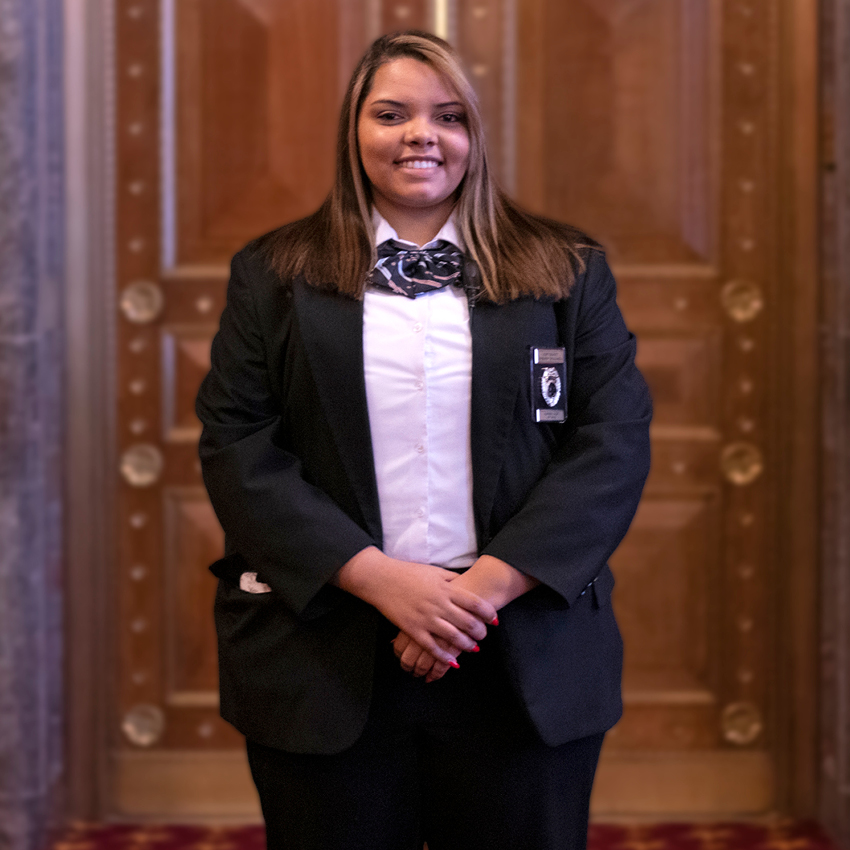Partners in Justice: Bailiffs
If you have questions in court, don’t know where to go or what to do, courtroom bailiffs are well equipped to help.

Bailiff Michelle Brown walks into the Licking County Probate-Juvenile Court in Newark at 7:30 each morning. She flips on the lights in the courtroom where a juvenile court magistrate presides. Brown checks that the laptops are operating and the online court calendar is set to the right date. Then she pages through case files and retrieves information needed for the upcoming cases.
That’s just the first hour of the day for Brown, before the gavel drops and the 8:30 a.m. hearings begin.
Brown also is armed – which is fairly common for bailiffs in smaller jurisdictions. Inside the courtroom and courthouse, she has arrest powers. Bailiffs who work in less populated areas have two overarching duties – providing courtroom security and keeping proceedings moving. In urban locations, local law enforcement typically takes on security, while bailiffs focus on helping judges and magistrates manage caseloads.
Yet that summary barely skims the landscape of responsibilities for bailiffs who work in courtrooms across Ohio.
“There’s a lot going on all the time,” says Marty Lighttiser, who was a bailiff in Franklin County Common Pleas Court for 18 years.
Lighttiser, who retired in 2014, spent more than half of her work week inside the courtroom, as hearings were held, pleas were taken, and decisions were issued.
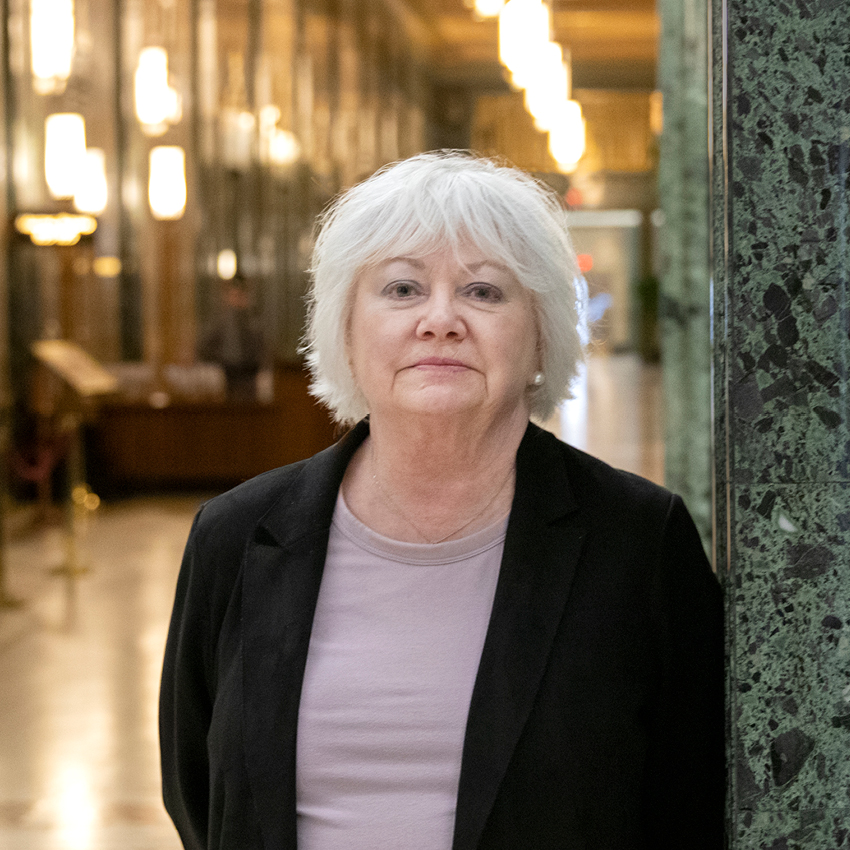
“There's a lot going on all the time.”
Each day, the Franklin County clerk of courts would set the schedule for the numerous courtrooms. Lighttiser says bailiffs tweaked the lineups as needed. It’s of great assistance to the attorneys practicing in the court who are juggling multiple cases in multiple courtrooms, she explains.
As attorneys checked in with her, she reordered the pile of folders on her desk to accommodate their shifting or double-booked schedules as best she could. The flexible approach reflected retired Judge Daniel Hogan’s philosophy that he and court staff were there to be helpful, Lighttiser says.
Later in her tenure, in the newer county courthouse, Lighttiser sat alongside the judge, below the bench. She could stand up and alert him – in a whisper – about tasks that needed attention. The judge’s secretary might slip through the courtroom back door to tell the bailiff to pass on information about an emergency legal matter, Lighttiser says. Or, a temporary restraining order might need signing.
Rounding Up Parties, Starting Court
Imposing a sense of order over a court day is a central assignment for most bailiffs working in courtrooms. As part of that, bailiffs often take care of gathering the parties in a case before a hearing can start.
In Licking County, the juvenile court addresses cases such as delinquency and traffic offenses, as well as charges against adults for child endangering or non-support of a minor. To start a hearing, Brown may roam outside the courtroom to locate the prosecutor, social workers, parents, and the minor’s attorney.
“I make sure everyone is in their place,” Brown explains. “Then I call the case and put us on the record.”
Going on the record includes Brown activating the court’s recording system before the magistrate officially starts court. Brown periodically enters information into the software that’s useful later, such as the name of the person speaking.
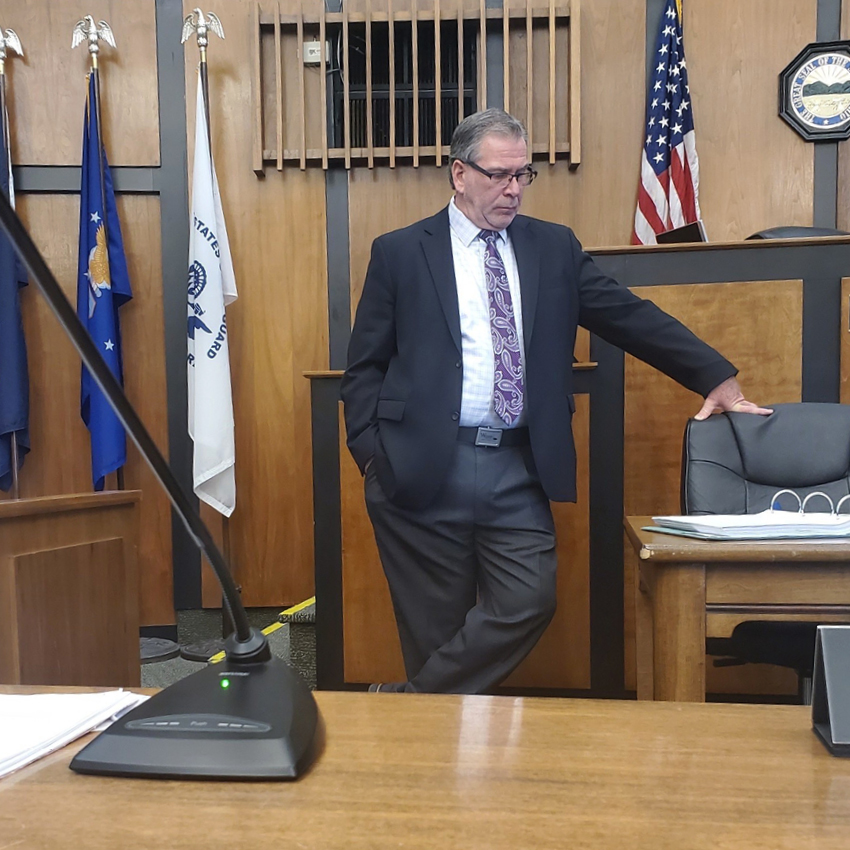
“You set the stage as a bailiff for proper decorum in the courts. Like a church, the courtroom should be a place of respect.”
Watching for Signs of Trouble
Brown also is alert for signs of disruption in the room.
Commotion may arise from people who can’t sit still or can’t stop talking, Brown says. Every once in a while, there will be yelling. Or someone participating in the case will simply stand up and walk out in the middle of the proceedings, she says.
Jay Fulton, a bailiff who works primarily on criminal cases with Judge Warren Edwards in Marion County Common Pleas Court, says at times he must act as a referee.
“Bailiffs are neutral,” says Fulton, who was a Columbus police officer for 33 years before joining the court. “But we will ensure that you behave correctly.”
In the Alliance Municipal Court, bailiff Jeff Carper describes limiting drama and outbursts in the courtroom as one of his roles, too. The one-time Alliance police officer and former private security specialist is the court’s chief of security.
“You set the stage as a bailiff for proper decorum in the courts,” Carper says. “Like a church, the courtroom should be a place of respect.”
“But I don’t want the public to think bailiffs are there for total authoritarian purposes,” he adds. “We’ll help you if you ask.”
Listening and Calming People
Carper tries to put people at ease. It’s a skill that’s handy in a hectic court, where Judge Andrew Zumbar and a part-time magistrate are presiding over arraignments, preliminary probable cause hearings in felony cases, pretrials for misdemeanors, certain civil cases, and occasional trials.
Eviction disputes are heard on Tuesday mornings. Carper sometimes heads out of the courthouse that day on the court’s behalf to execute orders returning property back to a property owner. When in court, his responsibilities are broad.
Along with ensuring overall security, Carper matches up defendants and plaintiffs, checking whether everyone is there for the hearings, which are scheduled every 10 minutes. He hands out paperwork. And before cases are called, the magistrate, the court administrator, and he sit down with tenants and landlords for court-ordered mediation to try to talk through the problems.
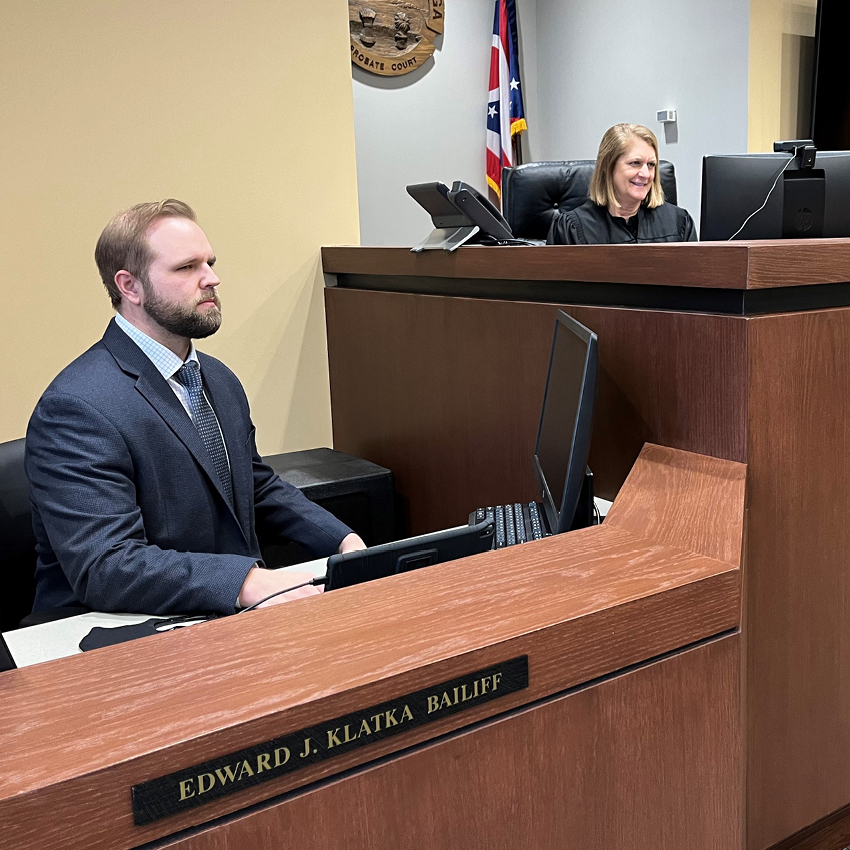
“I try to at least leave them with something helpful. And I try to leave them with a positive experience of the court.”
“Each side has a beef,” Carper states, “and tenants and pro se property owners tend to go at each other. I let them have a few minutes of that, then we’re done.”
Because he listened, he finds they often can move to a more calm, orderly discussion.
“It’s done in private, and it’s an opportunity for people to get things off their chests,” he says.
Bridging Public Understanding and Court Needs
Edward Klatka, bailiff for Judge Laura Gallagher in Cuyahoga County Probate Court, points out that people ordered to court are at a loss as to what they are expected to do. The probate court considers a mix of matters – will contests, trust disputes, adult protective services issues, adoptions, and more.
“Most people are required to be there. It’s not by choice,” says Klatka, who describes his job as part social worker, part counselor. “Courts need someone to be the gatekeeper and the liaison between the public and the judge. Giving participants a way to access the court is essential.”
Klatka explains that the parties in cases, and the public generally, don’t understand the ban on ex parte communications and how that means they can’t speak directly to judges. No one side can appear to have improper access to a judge, who must be neutral. Klatka does what he can to answer questions, whether from someone wandering the courthouse, sitting in a hearing, or phoning the court. In fact, Klatka gets the calls others aren’t sure how to handle.
“I like it,” he remarks. “I usually have an idea who to refer people to. I try to at least leave them with something helpful. And I try to leave them with a positive experience of the court.”
Brown in Licking County identifies another aspect of the work – comforting people. She hands out tissues when things become emotional, offers bottles of water, and occasionally shares a few words of encouragement for the future.
“The courtroom is a mystery to a lot of people. It’s a little scary,” she notes.
Even potential jurors are finding their way through an unusual, often new, experience when summoned to serve. Lighttiser says the jurors sitting on trials in the Judge Hogan’s courtroom were her responsibility. She fielded their questions and shuttled them from place to place, as needed.
She also accompanied jurors on “jury views” – trips to locations relevant to a case. If a jury was sequestered during a trial and had to stay in a hotel, she would join them. That happened maybe a dozen times in her 18 years as a bailiff, she says.
“It was always interesting to interact with 12 strangers for 12 to 15 hours a day,” she notes.
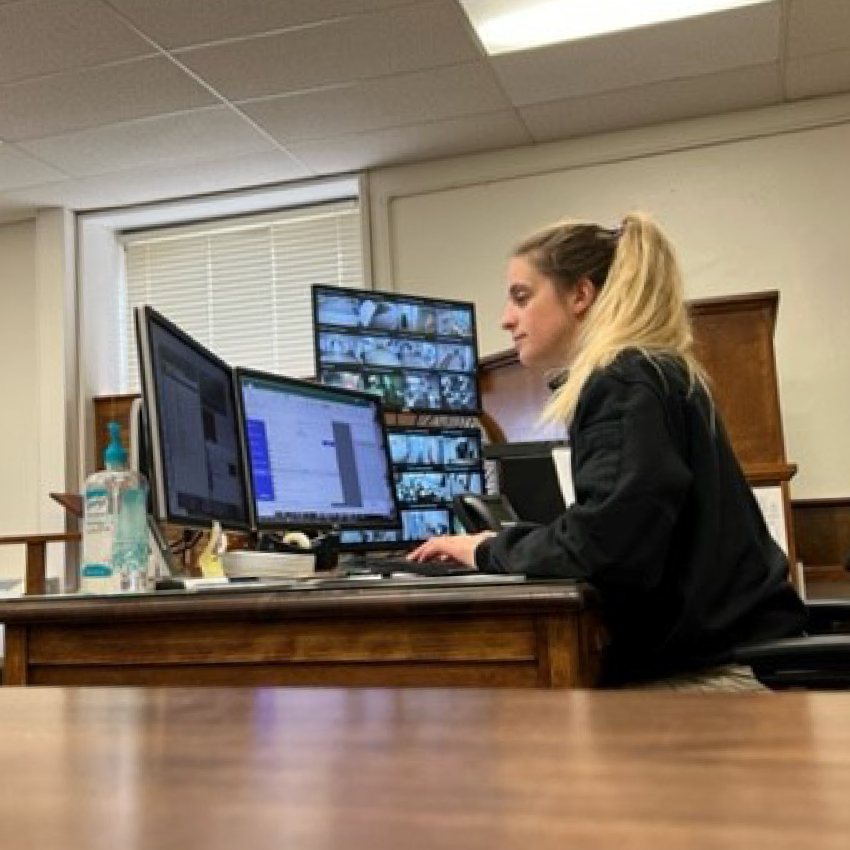
“The courtroom is a mystery to a lot of people. It's a little scary.”
From Forest Service to Probate Court
Bailiffs clearly are instrumental to Ohio’s courts. And their backgrounds are as diverse as their duties.
Klatka mentions that he also labels exhibits, runs the recording system, talks to attorneys, and monitors the docket for last-minute changes. Klatka, who joined the probate court in 2011, says he’s always been detail-oriented and adept with logistics.
A few years earlier, Klatka had returned to Ohio after finishing a stint with the U.S. Forest Service in the Idaho Panhandle National Forest where he hiked across the grounds, clearing and maintaining hundreds of miles of trails. He was thinking about graduate school – maybe law school, maybe education.
While considering his options, he met Judge Gallagher when he was working with youth at his church. When she was looking for a bailiff, she reached out to Klatka. He thought it sounded like fun. He says a job as a resident advisor in college really prepared him for communicating with people during difficult situations.
“It was a great career choice,” he says. “And I met my wife at the court, and we now have three kids.”
Doing What's Needed for Best Outcomes
Like the other bailiffs, Fulton has administrative responsibilities in Marion County. He also might be found stationed at the courthouse metal detector or addressing security problems, like finding drugs in the building.
“And, as the judge reminds me, other duties as assigned by him,” Fulton laughs. “In a small county, everybody has to pitch in to make it work for the overall good of the court.”
Fulton and Judge Edwards met in their prior jobs. At that time, the judge was a Franklin County prosecutor, and Fulton worked with him on about a dozen homicides as a police officer before retiring from the force in December 2020.
With the pandemic in full swing, Fulton’s wife was working from home. Him, not so much. He had to find something to do. When he heard the judge’s bailiff was leaving, Fulton inquired.
“I like being involved in the process and seeing another side of it,” Fulton says. “And it gets me out of the house.”
Experiences With Prosecutors Powered Path to Bailiff
The prosecutor’s office is also where Lighttiser’s career around the courts began – first in Licking County, then Franklin. In the Franklin County Prosecutor’s Office, she was in the child support unit and soon moved to the grand jury unit. Hogan was a senior assistant prosecutor, and he and Lighttiser often interacted on his cases.
When Hogan was elected to the common pleas court in 1996, she joined him as his bailiff and stuck around for his full three terms. A favorite part of the position for her was listening to the stories of the cases.
“There was always something new and different,” she recalls.
Learning From People in Court
Carper, a self-described “jack-of-all-trades,” notes that he also juggles clerical chores, including delivering judgment entries to the clerk’s office. And he mentions one of the more unusual bailiff activities – arranging for clubs on vehicles for people the court finds have driven while impaired.
Carper held several positions in the Alliance Police Department over 17 years before leading a private security group in Afghanistan.
“I began looking for a ‘real job’ after the young guys started calling me ‘grandpa,’” he chuckles. That’s when he discovered the bailiff opening. He thinks the role has mellowed him.
“I’ve listened to the people in the cases, I’ve seen them cry,” Carper explains. “I probably approach things with more patience and empathy now. The people before the court are human, and they need help.”
Lack of Design Openings Leads to Law Enforcement
For Brown, she had no plan to pursue a path in law enforcement or the courts. She went to college in Bowling Green and earned a graphic design degree. Her father had been a reserve deputy in the Licking County Sheriff’s Department since she was a kid and served with the mounted horse unit. When she had trouble securing a design job, she was drawn to the mounted unit. She obtained peace-officer training and became a part-time police officer.
Her police chief did security for the Licking County Domestic Relations Court, and he connected her to a job at the courthouse’s security checkpoint. It’s been eye-opening for her.
“Hearing the stories of what happens to kids and infants and their families – neglect, physical and sexual abuse, drugs – I’ve realized the truth of things that happen,” Brown says.
“I’ve had to grow up,” she adds. “I value the opportunities I’ve been given and the way I was raised. I realize how things could have been different.”
Brown still squeezes in time with the horses, doing events with the mounted units in Licking, Franklin, and Delaware counties. And her graphic design skills haven’t gone to waste. Judge Deborah Lang has tapped into those talents. Brown has designed court logos, patches, business cards, and foot mats, plus the annual report – providing a few unexpected perks for the court.
Help Comes in Many Forms
Bailiffs have a front-row view to the struggles people face in their lives and the circumstances that land them inside Ohio’s courtrooms. The bailiffs see helping the public as a positive.
“You made a mistake, let’s change that. What do you need?” Carper says.
Klatka adds that those necessities can be the most basic staples. In Cuyahoga County, the judge oversees an assisted outpatient treatment docket, where people with mental illnesses meet with a support team instead of depending on emergency rooms and hospitals for services. Along with suffering from mental illnesses, it became clear the people before the court lacked essentials such as food, clothing, and shelter, Klatka notes. To encourage them to return to court, the judge and staff try to assist with everyday needs, offering McDonald’s gift cards, snacks, shoes, hats, and gloves. Klatka says the judge once surprised a woman who said she loved to cook but didn’t have cookware with a set of pots and pans.
The conscientious efforts of the bailiffs pay dividends to the justice system.
Carper finds that people, especially younger ones, are surprised by how the court aids them. “You guys are actually pretty nice,” they’ve told him.
“One man I knew from my police days appeared in this court and came over to me. He said, ‘I want to thank you. You always treat me like a human being,’” Carper notes.
“We follow their lives,” Fulton says. “When they stumble, we’re not there with a sledgehammer. We try to work through these things.”
“The administration of justice is a noble service,” he adds. “I feel like I’m doing some good.”
CREDITS:
Design: Ely Margolis
Web: Erika Lemke

